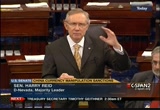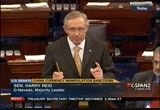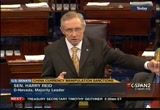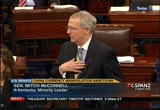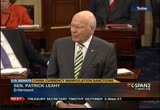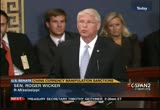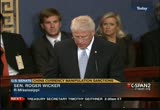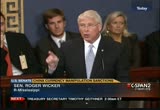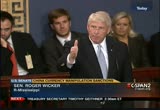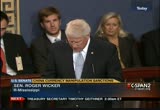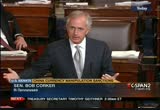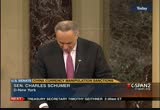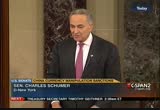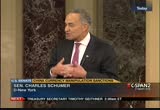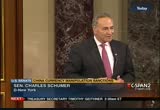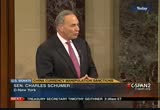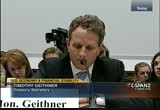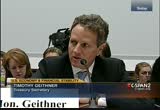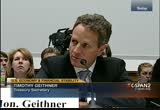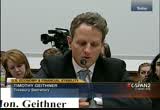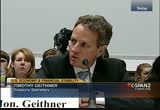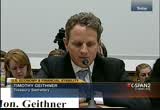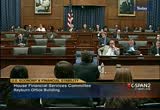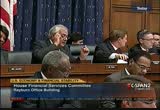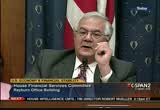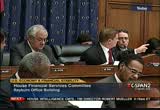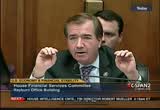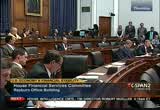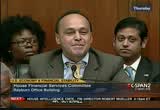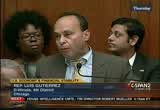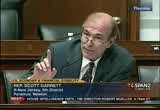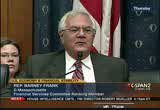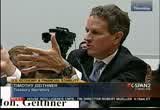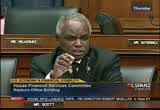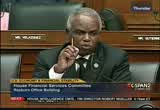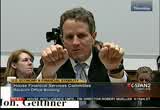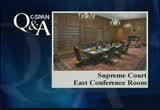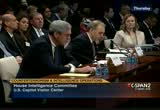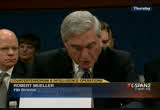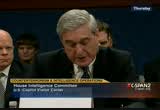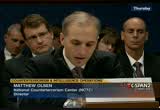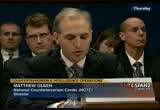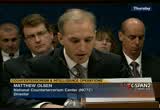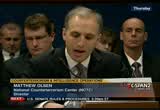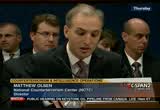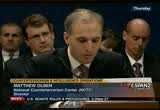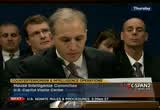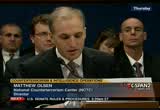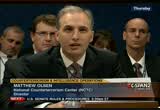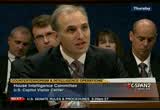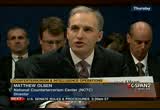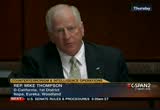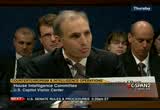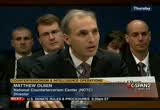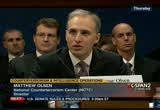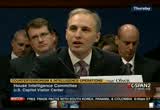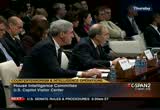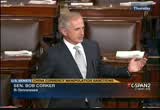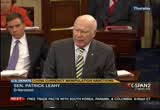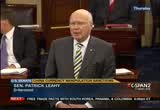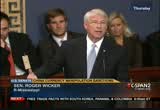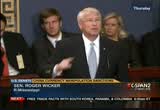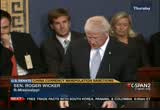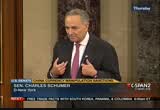tv Today in Washington CSPAN October 7, 2011 2:00am-6:00am EDT
2:00 am
over 60 members as this one did. if you're not among those 60,k. take bad votes, and at some points if 60 members of the senate want a bill to pass, it will pass. if 60 members of the senate don't want a bill to pass, it won't pass. and it is more time-consuming. and i assume that's why a lot of people ran for the senate instead of the house, because they wanted to be able to express themselves. this is a free-wheeling body, and everybody is better off when we operate that way. everybody is. whether you're in the majority or the minority, because today's majority may be tomorrow's minority. and the country is better off to have at least one place where there's extended debate and where you have to reach a supermajority to do things.
2:01 am
so i would say to my good friend, the majority leader, i understand his frustration, but you were going to win on this bill. you didn't need to jam us. you shouldn't jam us on any bill. but on this bill, you were going to win. now some of us think we were wasting our time because as the senator from tennessee said this wasn't going to become law anyway. we're sitting around here when we ought to be passing trade bills. the president asked us to vote on his jobs bill. i wanted to give him an opportunity to have a vote the other day. you guys didn't want to vote on what the president was asking us to vote on without any changes. but you could prevent that, and you did. look, let's don't change this place. america doesn't need less debate. it needs more debate. and when 60 members of the united states senate decide to pass something, it will pass. i think we made a big mistake tonight. and as soon as we all kind of cool off and think about it over the weekend, i hope we'll undo
2:02 am
what we did tonight because it's not in the best interest of this institution or the american people. mr. reid: mr. president? the presiding officer: the majority leader. mr. reid: the senate should function like the senate, and i acknowledge that. but we have major pieces of legislation that have been brought down as a result of not being able to have finality of that legislation. unending amendments, not germane, irrelevant. the small business administration bill that passed in the past years easily. we had the economic development administration bill, passed easily. job-creating bills that we had an open amendment process, they were brought to -- simply stopped. now there are rules of germaneness in the senate. there are rules of germaneness in the senate. and let's think about these amendments that i agreed to. there are others i didn't agree to, but the amendments i agreed
2:03 am
we should have a vote on. not that i wanted to have a vote on them because they had nothing to do with the underlying bill. nothing. and there are rules of germaneness that that should be the case. mr. mcconnell: rules of germaneness before cloture? mr. reid: the demint amendment right to work. cornyn amendment on taiwan. we had a vote on that. hatch amendment, that is relevant and germane. barrasso, not so. cole federal funding. mcconnell, jobs act. mr. president, part of cloture is enforcing germaneness. that's what it's all about. we're happy to do germane amendments. but the fact is the republican leader himself decided not to have amendments on this bill. i agreed to amendments on the bill prior to cloture. if everybody doesn't know that, they should because that's the way it is. so, mr. president, we have to make the senate a better place,
2:04 am
and i think a better place is to do what was done tonight. get rid of these dilatory amendments. i mean, this is -- we would be happy if poor senator bingaman could get some bills out of the energy committee. we could do something on cement. we could do something on -- if we could get some bills out of the foreign relations committee, we could maybe look at foreign aid. these things are dilatory and only unnecessary in an effort to divert from what we're really trying to do here, and that is legislate. the issue is this, mr. president. i believe that what we did at the beginning of this congress was the right thing to do. but as the weeks and months have rolled on, wasting months of our time on a c.r. that was done on a series of c.r.'s one week, two weeks, three weeks, funding government until october, a few
2:05 am
days ago. what a waste of time. we have spent months, months on raising the debt ceiling. months and making it nearly impossible, if not impossible, to legislate on other matters. and when we get a chance to legislate, we shouldn't be held up by these dilatory matters. i'm welling to legislate. i'll take a lot of hard votes in my career and i would be happy to vote on these. but there has to be an end to this. i'd be happy if my friend -- mr. mcconnell: let me make sure i understand. there aren't any rules of germaneness precloture in the senate. there aren't any. any amendment can be offered on any subject. and that's been one of the great frustrations of every majority down through the years, and we all know that. so my friend, the majority leader, in order to prevent votes on unpleasant amendments, fills up the tree and decides himself that he's going to confine the amendments to those
2:06 am
that are either germane, relevant, or put another way, of his choosing. of his choosing. mr. reid: what was that? mr. mcconnell: of your choosing. whatever you want to allow. my friend keeps talking about wasting time. wasting time to him might not be wasting time to us. who gets to decide who's wasting time around here? none of us. none of us have that authority to decide who's wasting time. but, the way you make things happen is you get 60 votes at some point and you move a matter to conclusion. and the best way to do that is to have an open amendment process. that's the way this place used to operate. i've been here awhile. i know this isn't the way it's always happened. this is not the way we always operated. and we did get things accomplished. not by trying to strangle
2:07 am
everybody and shut everybody up, but by allowing the process to work. and when the senate gets tired of the process, 60 people shut it down, and you move to conclusion. that's how you move something ahead, not by preventing the voices. i mean, we have sat around here two days in quorum calls. you all notice that? we could have been voting on amendments. sitting around in quorum calls. talk about a waste of time. mr. reid: mr. president? mr. president? mr. president? i'm going to respond to this. i don't know the exact number now, but almost 30 judges are waiting to be approved. people who are waiting to change their lives for their patriotic duty to public service. we can't -- i can't file cloture on all those: there's 29 of them. we, mr. president, have been
2:08 am
stymied here in this congress in getting things done. holding up nominations for judges. holding up nominations, some people have been on the executive calendar for a long, long time. it's unfair. that's what's going on. we can do all the make-believe that my friend, the republican leader, is talking about, about what great things should happen around here. i'll tell you a few things should happen. we should be able to move matters through here that have been happening since the beginning of this country. nominations, for example. we can't do that because my friend the republican leader, an candid as he was said his number-one goal was to defeat president obama. that's what's been going on for nine months here. this issue relating to these dilatory tactics on these motions to suspend the rules is part of that game that's been played. i agree. let's get back to legislating as we did before the mantra around
2:09 am
here was defeat obama. mr. leahy: mr. president, would the majority leader yield for a question? mr. reid: i'd be happy to yield. the presiding officer: the senator from vermont. mr. leahy: mr. president, i pose this question, and i look around this floor, with the exception of senator inouye, my dear friend from hawaii, nobody has served in this body longer than i have of the current membership. nobody. i keep hearing this talk about 60 votes. most votes you win by 51 votes. and this constant mantra of 60 votes, 60 votes, this is some new invention, i tell my friends based on my history. so my question to the majority leader, whether we were here with a democratic majority or a republican majority, does he remember a time when judges who were confirmed unanimously,
2:10 am
every single republican, every single democrat voting for them out of committee would then sit on the calendar for three, four, five, staoeuplgs six months -- sometimes six months because there's not an agreement to vote on them without a 60-vote supermajority. i cannot remember any time in 37 years. i don't know if the majority leader recalls such a time. mr. reid: the senator from vermont has been here longer than i have, but he's absolutely right. i would also, mr. president, add this. the republican leader said, and i think this says it all, today, extemporaneous remarks from his position here where he's now standing -- and i quote -- "if 60 senators are in favor of bringing a matter to conclusion, it will be brought to conclusion. that's what happened a few minutes ago." and that's what cloture is all about. that's what cloture is all
2:11 am
about. i believe in cloture. as i've indicated several times earlier, i wasn't in favor of changing the rules relating to cloture as some of my colleagues did. but i think this is a step forward. it will make this process work a lot better. i want to tkwraoeld to my friend from -- yield to my friend from mississippi. yield for a question. the presiding officer: the senator from mississippi. mr. wicker: i want to thank the distinguished majority leader for yielding. i will not take long. i've been in the senate four years now, and i think my colleagues know i don't come down to the floor and spout a lot of hot air. but i but i have to be heard tonight, and i will agree with my friend, the majority leader, on one thing. this is no way to legislate. he said those words a few moments ago, and i agree. we have become accustomed to a procedure, and i have disagreed
2:12 am
with that procedure, but it has been the regular order during the time i have been here, and that is the usual practice is a bill is brought to the floor and the majority leader immediately offers every amendment that can possibly be offered in a parliamentary way, thus filling the amendment tree and preventing other senators from offering amendments. then cloture is filed and we don't have an opportunity to have a full hearing. i am told this has not always been the practice, but we have been accustomed to that practice. what happened tonight is far different from that, and i think that's why my friend from tennessee propounded the question to the majority leader.
2:13 am
we had a bill and it may be a messaging bill, but if it were passed, it would be a significant piece of legislation. i think both sides acknowledge this. and no amendments were allowed precloture, and no amendments have been allowed postcloture, and the majority leader this very day after the cloture vote assured the senate that we would be operating under an open process, he said those words. of not only that and perhaps the majority leader when i finish in just a moment or two could -- could correct me, but i believe i heard the majority leader say we would be allowed to offer motions to suspend the rules on a number of amendments and debate would be allowed. now, what occurred was senator
2:14 am
coburn offered his motion to suspend the rules on his amendment, and we assumed that we would be able to do this on at least a few amendments, but the very first amendment that was offered, the majority leader suggested to the chair and made the point of order to the chair that that was dilatory, one amendment. one amendment, and that was deemed dilatory by the majority leader and the parliament correctly instructed the chair to overrule that suggestion by the majority leader. upholding the precedence of this senate. and one by one, democratic members of this body had to march down and vote to overrule
2:15 am
the parliamentarian of this senate for the very purpose of shutting down the chance to offer one single amendment. when the -- when the majority leader well knew he had the votes to win, but our rules have, i thought, been designed and i think our society is designed around the concept that the minority has an opportunity to be protected, the minority has an opportunity to be heard in this body of all bodies. and what we have come tonight unless we can remove that is we have changed the rules of the senate on a messaging bill, on a matter that the majority leader had the votes on. so that is my objection. that is why i am so disturbed about the overreaction and
2:16 am
heavy-handedness of this move. this is not a matter of supporting of one bill that he wants to get us out of town on. this is precedent, and we have -- unless we can change it, we have forever changed the right of the majority to be heard postcloture, and i am saddened about that. the presiding officer: the majority leader. mr. reid: first of all, let me tell my friend that amendments could have been offered pre- cloture, and my friend said he thought we would be able to offer some amendments postcloture with their motions to suspend the rules, and that's what i said would happen and i agreed to that. seven amendments. now, people were saying well, you choose the amendments. i didn't come up with those things. they came up with them. they are the ones they gave me.
2:17 am
i guess i was supposed to pick and select which ones they did. that's what i did. i could not get agreement on some of these amendments. i have explained that in some detail previously. now, also everyone should recognize motions to suspend the rules are still available. they are just not available postcloture. the rule 22 provides -- quote - "it is the sense of the senate that debate shall be brought to a close." that's what it says. i'm sorry my friend is disappointed, but i think the play book that he is reading from is not really accurate. mr. mcconnell: i would say to the majority leader -- the presiding officer: the republican leader. mr. mcconnell: the senator from mississippi is accurate. until the vote we had just a few moments ago, motions to suspend postcloture were appropriate, and no longer are they appropriate because, as my friend from mississippi pointed out, we have in effect changed
2:18 am
the rule. a senator: mr. president. mr. reid: i yield to my friend from tennessee. mr. corker: first of all, i want to thank the leader for taking the time to explain from his perspective what has happened. i guess what i'd like to -- mr. president, to understand is when amendments are offered, why don't we just go ahead and vote on them? i mean, it's become standard procedure -- mr. reid: could you start over? i was interrupted. mr. corker: that's no problem. i want to thank the leader for taking the time to explain from his perspective what has happened. here is what i don't understand. we have a cloture motion, a motion to proceed on a monday. it's thursday night. we have had no votes on anything other than a cloture vote. i guess what i'd love to understand is why don't we just immediately begin voting on
2:19 am
amendments. we could have been done with this bill yesterday. instead, everybody cools their heels, waits around while some negotiation takes place. it's sort of a self-appointed rules committee, and then at the end something like this happens. i'd like to understand from the leader's perspective, mr. president, why we don't just go ahead and vote on amendments. again, we could have been done yesterday. the presiding officer: the majority leader. mr. reid: mr. president, if i could just respond to my friend, people around here are talking as if this is something that never has happened before. this has happened -- i don't remember all the times that i have been in the senate that the chair, as brilliant as our parliamentarian is, and the chair does his best to sustain what the parliamentarian wants, he is not always sustained. there are all kinds of examples. and i have been involved in a number of those. so it -- this isn't as if it never happened before. we did this with the understanding that what is going on here is dilatory, and that's
2:20 am
what the majority of the senate felt. i would yield. mr. schumer: would you yield for a question? mr. reid: i would be happy to yield to my friend. mr. schumer: i would like in the form of a question to the majority leader also try to impart some -- because we're all frustrated. and the senator from tennessee and i talked about that frustration at the beginning of this session in an attempt -- obviously, it hasn't worked terribly well -- to try and straighten this out. and you are frustrated. we can talk about the specifics here, and the one point i would make is the majority leader, isn't that true, mr. leader, offered on the floor, he said i will allow amendments on this bill yesterday, and the only amendment that was sent to us was the amendment to have a vote on the president's budget, is that correct? that was before cloture was filed. mr. reid: that's right. mr. schumer: and it was not widely known on this side, but the majority leader had offered amendments on this bill. but the question i want to ask and i want to make a statement -- or i want to lead up to the question.
2:21 am
you're frustrated because you feel the tree is filled all the time and you can't make amendments, but we are frustrated because the 60-vote rule, which has always been used here, is now used routinely, which it never had been done before. judges, district court judges. i have been here in the senate 13 years, i was in the house 18 years and followed the senate, cared about judges. it never happened before. routine appointments, assistant secretaries of this, deputy secretaries of that, 60 votes. and on bill after bill after bill, the procedure of this place works that somebody has to object. that's why you file cloture. otherwise, we could proceed. in the past, the motion to proceed was not routinely blocked.
2:22 am
and almost every single bill -- important bills, obviously. no one thinks the health care bill should have passed by 51 votes, but on minor bills, we had a filibuster on technical corrections to the transportation bill. route 287 was written down 387 by mistake, and it was filibustered. 60 votes. so our defense is to fill the tree. but what we ought to try to do here -- and as i said, the senator from tennessee and i futilely tried earlier this year and maybe calmed things down -- is maybe use this flash point to try to come together and work that out again. that may be the -- that maybe the minority would not filibuster routinely everything, appointments, judges, minor
2:23 am
bills, save it for the major bills, and in return i agree with the minority leader, the republican leader, the deal around this place is the majority sets the agenda and the minority gets to offer amendments. that has been the rule since i got here and it's one of the reasons, you're absolutely correct i say to my friend from kentucky, why i left the house to run for the senate, but it's gotten to an extreme. you would say, my colleagues on the other side of the aisle would say it got to the extreme because we always fill the tree. we would say it got to the extreme because you filibuster everything and require 60 votes. we only have 53, we know that, on everything, judges, appointments, minor bills. and if we're going to bring this place back to order -- and my friend from tennessee, the junior senator from tennessee, if we're going to bring this place back to a way where we can legislate, we are going to have
2:24 am
to both sides back off and we're going to have to figure out how to do that, which we haven't very adequately yet. just one other point before i ask my question. the senator from west virginia had a few of us on his boat this week, and a number of the freshman senators from the other side of the aisle were on the boat and i was on the boat, and we began to talk about they were asking why is the place so mixed up. i was explaining some of the greatest joyce i have had in the senate and the house were conference committees and offering amendments and things like that. and we all said together why can't we get back to that? but let me say that it is not simply filling the tree and preventing amendments that has caused this problem. it is routinely requiring 60 votes before the senate gets a
2:25 am
drink of water. and so my question to the majority leader is this -- would he be willing -- and we need a little bit of a cooling off period. would he be willing to sit down with the minority leader and others in an effort to try and figure out how we can get back to somewhat more of a regular order? in regards to what i said. mr. reid: to my friend and to others who are listening, so everybody understands a little bit of the frustration that i have, we all went through the battle on the fema bill. everyone remembers that. people in the dark bowels of this building someplace typed that bill up. they made a mistake and had a comma, a comma in the wrong place, a comma in the wrong place. i asked consent, that was a
2:26 am
technical correction, could we get that done. there were already press releases out from my republican friends, we're not going to agree to any consent on anything. so you talk about frustration, there is plenty of it to go around. mr. president, i want to try to end this on a high note. i love this institution. i've devoted most of my life here in this building. not only as a long-time member of the house and the senate but i lived here going to law school. i worked in this building. i was a cop in this building. i love this building, i love this institution. i don't want to do anything to denigrate the institution. maybe there is blame to go around. i think there probably is. but frustration builds upon frustration, and as a result of that, we have situations just like this. so here is my suggestion: i
2:27 am
think that just as we had a cooling-off period as we indicated that we would on that fema c.r., we had a cooling-off period, the republican leader and i agreed that that would be the right thing to do and we came back and worked something out. we did it very quickly. it wasn't to everyone's satisfaction, i had people upset, he had people upset but we did that. it would be my suggestion that we do what i originally suggested, i think we should go ahead and do final passage on this matter on tuesday night, and do the judge first and vote on the jobs bill. and we'll do the trade stuff. and i am happy to not only sit down with the republican leader and, you know, i'm sure we can all cinch up our belts and as i -- they say in the old and new testament gird our loins and try to do a better job of how we
2:28 am
get along here. i've talked to the republican leader only briefly about this, but i had a discussion with my leadership today, and one of the things that i was going to announce and so here it is, one of the things i want to do is have a joint caucus. i want to have one with democratic senators and republican senators and at that time we can all talk about some of the frustrations we all have. i wanted to do 25 the first week we got back after the next recess. i hope that doesn't -- all my people don't know about this and certainly i haven't finalized this with the republican leader but i think that would be a good step forward, that senator mcconnell and i could be there in front of everybody else together, questions could be asked, statements could be made, and we could see if that would let a little air out of the tires. but -- and i'll be happy to next time we get cloture, in that event sometime in the future, to sit down and find
2:29 am
out what, if anything, we should do postcloture on matters relating to people who are frustrated. so that's my statement, mr. president. so i -- i'm not asking for consent on anything, but i would hope that we could all leave and i would have senator mcconnell and i would direct the staff to come up with something, an arrangement comparable tothere objection?
5:25 am
mr. reid: mr. president -- the presiding officer: without objection. mr. reid: thank you very much. as i understand the rules, each nor is entitled to an thundershower speak postcloture if they care to. it is my understanding that senators corker, wicker and vitter wish to speak postcloture. it would be better for everyone here -- and, you know, an hour, if you want to speak for pan hour, that's fine. i have to place to go. but if you could -- if we could all have an idea as to how long senator corker, senator wicker, and senator vitter wish to speak, it could help us manage what's going on here. so if i could direct this expression through the chair to my friend, senator corker. the presiding officer: the senator from tenton. mr. corker: thank you for recognizing me. i really don't want to speak. here's what i want to happen. i think members on both sides of the aisle feel like this institution has-to-degraded into a place that is no longer a
5:26 am
place of any deliberation at all. and i'd like for you and the minority leader to explain to us so that we have one story here in public as to what has happened this week to lead us to the place that we are. that's all i'm asking. that's all i want to know. explain how the greatest deliberative body on a bill that many would say was a messaging bill in the first place ended up having no amendments and we're in this place that we are right now. i'd just like to understand that. mr. reid: mr. president, through the chair to my friend from tennessee and others who wish to listen, we moved to this legislation with a very -- the china currency with a heavy vote. 79 senators who wish to proceed to that. once we were on the bill, i have -- i partially filled the tree, and why did i do that?
5:27 am
because i found over the last congress and nine months that when i try to have an open amendment process, it is a road to nowhere. it just hasn't worked. we haven't been able to effectuate a single bill being passed that way. regardless whether that's right or wrong, that's what i did. senator mcconnell wanted to offer an amendment on the president's jobs bill. to do that, he -- and that in effect tied us down because he wasn't willing to let us move to any other amendments. i was willing to move to other amendments. specifically, everyone that was involved in this process thought that senator hatch was entitled to an amendment because his was clearly germane and relevant. but without going into he said, he said, the fact is that no
5:28 am
amendments were offered, even though i was happy to have some amendments offered. now, what has happened over the last nieng months -- nine months is that -- and hurricane katrina this went on last year where we and even this went on last year where we learned about this. when cloture was invoked, senators -- it was led by senator demint and then senator coburn picked up on this quickly. as soon as cloture was invoked, motions to suspend the rules were filed. now, as i said today, that was done in this instance. now, i know that my republican friends say the reason we did that is we couldn't offer amendments on the underlying bill. i disagree with that. i think people could have offered amendments, but we're at the point where we were. we had nine or ten amendments relating -- nine or ten motions to suspend the rules. i worked all day, much of the
5:29 am
time later this afternoon, with the senator -- with senator mcconnell trying to come up with a list of those amendments. a list of those amendments that had been suspended. i had to get approval of my caucus to move to all of those amendments. i couldn't do it. i couldn't. i, in effect, made a number of my senators very unhappy by moving to amendments that are extremely difficult. they are not -- the only amendment that i am aware of that's germane to what we were working on is senator hatch's amendment. the rest of them are not germane. they may be good amendments, great message amendments, causing a lot of pain over here, but i agreed to do seven of the nine. and senator mcconnell said that he needed at least one more. i couldn't get one more. so, what procedurally took place here is this: i believe that, as i indicated in my opening statement, that
5:30 am
rule 22 dealing with cloture says that when cloture is invoked, it is a finite -- it's finite, ends debate on that issue. unless there are amendments that have been filed that can be dealt with during the 30 hours. there weren't any in this instance. so i have been here quite a while, and one of the most unpleasant things i've had to deal with over the years has been the vote-a-rama when we do the budget thing. we've had 60, 70, 80, 120 amendments filed. urpdz this procedure that has recently been -- under this procedural that has been recently been adopted by the minority in this instance, there's no limit to how many amendments can be filed. today there was nine or ten. this has to come to an end. this is not a way to legislate. and that's why the motion to overrule the ruling of the chair -- that's why i made that. i think this is something that was discussed in great detail at
5:31 am
the beginning of this congress. i had a number of senators on my side who believed very strongly, as my friend from tennessee has just described, that the senate has become a place that's very difficult to debate anything. and so senators merkley and senator udall joined by others wanted to change the rules. and at that time we believed -- and the parliamentarian and all the law that we were familiar with -- said a simple majority could change the rules dramatically. as how to relates to filibuster and all other kinds -- other things. i had felt that -- i felt that certain changes were important, and maybe we should ease into this. that's why we are not reading the amendments now, as we used to do, be forced to do on occasion. and we had a gentleman tion agreement that there would be motions to -- motions to proceed
5:32 am
would not be opposed to generally. i would not fill the tree all the time. and as a result of that, senators merkley and udall, much to their consternation because i didn't join with a majority of my caucus -- opposed what they did. because i was hopeful that we could get back to doing some legislating that we had done in the past. now, i feel very comfortable that what we're doing and what we did today is the right thing to do. my staff this morning when i talked about doing this, the first thing they said to me, well, what if you're in the minority? let kneel everyone within the sound of my voice, if i -- if i were in the minority, i wouldn't do this. i think it's dilatory and wrong. just as i have sea said when we were -- just as i've said when we were in the famous debate that's now famous dealing with the judges issue that we had the nuclear option. i said, if i were in a position
5:33 am
to exert when i felt was the nuclear option on jurnlings i wouldn't do it. and i wouldn't. i think we have to do a better job of legislating here under the rules. and so even though perhaps senator merkley and senator udall were disappointed in my advocacy to not massively change these rules, i went along hoping that things would work out better. what just took place here is an effort to try to expedite what goes on around here. and, am i 100% sure that i'm right? no, but i feel pretty comfortable with what we've done. there has to be some end to the dilatory tactics to stop things. cloture means end. it's over w. mr. mcconnell: mr. president, who has the floor? the presiding officer: the minority leader has the floor. mr. mcconnell: i'd like to give my very, if i may, to the -- the presiding officer: the majority leader has the floor. mr. reid: i yield to my friend, the republican leader,
5:34 am
to respooned to any questions that the senator from tennessee may have. mr. mcconnell: yes, let me -- the presiding officer: without objection. mr. mcconnell: for the benefit of our colleagues, let me explain what exact happened. iit is not complicated. it was pretty clear, whether you liked this bill or didn't, it was going to pass. you could tell that by cloture on the motion to proceed with a very large majority. so i don't think my good friend, the majority leader, had to worry about whroarnst whether or not his bill was ultimately going to pass. the question was whether there were going to be any amendments at any point to the bill. and my conference made a decision, actually against my best advice, to go on and invoke cloture on the bill after we had had no amendments. and the reason we had no amendments is because the majority leader used a device that we've all become all too familiar with called filling up the tree. thereby allowing no amendments that he doesn't approve.
5:35 am
and he said we're open for amendments. but what he means is we're open for any amendment that i approve. so he filled up the tree, and prior to cloture on the bill, controlled whether any amendments would be allowed and chose not to allow any as a practical matter. so against my best advice, my conference decided to invoke cloture on the bill, so we were moving toward approving the bill with no expression whatsoever. and so we have in the postcloture environment the motion to suspend kh-rbgs has not been -- which has not been abused by this minority. not been abused by this minority. the majority leader in effect has overruled the chair with a simple majority vote and established the precedent that even one single motion to
5:36 am
suspend, even one is dilatory. changing the rules of the senate. and if you look back at this bill, what we've had in effect is no amendments before cloture, no motions to suspend after cloture, no expression on the part of the minority at all. and i don't know why anybody should act like they were offended by nongermane amendments. this is the u.s. senate. we don't have any rules of germaneness. no, we don't. any subject on any bill can be offered as an amendment. we all know that. now, the fundamental problem here is the majority never likes to take votes. that's the core problem. and i can remember when i was the whip in the majority saying to my members over and over and over again when they were
5:37 am
whining about casting votes they didn't want to vote that the price of being in the majority is you have to take bad votes. because in the united states senate the minority is entitled to be heard. not entitled to win, but entitled to be heard. that is the core problem here. i say to my friend the majority leader, nothing personal about it, we are fundamentally turning the senate into the house. no amendments before cloture. no motions to suspend after cloture. the minority's out of business. and it's particularly bad on a big that has the support of over 60 members, as this one did. if you're not among those 60, you're out of luck. now look, this is a bad mistake. the way you get business done in the senate is be prepared to take bad votes, and at some
5:38 am
points if 60 members of the senate want a bill to pass, it will pass. if 60 members of the senate don't want a bill to pass, it won't pass. and it is more time-consuming. and i assume that's why a lot of people ran for the senate instead of the house, because they wanted to be able to express themselves. this is a free-wheeling body, and everybody is better off when we operate that way. everybody is. whether you're in the majority or the minority, because today's majority may be tomorrow's minority. and the country is better off to have at least one place where there's extended debate and where you have to reach a supermajority to do things. so i would say to my good friend, the majority leader, i understand his frustration, but you were going to win on this bill. you didn't need to jam us. you shouldn't jam us on any bill. but on this bill, you were going to win. now some of us think we were wasting our time because as the senator from tennessee said this wasn't going to become law
5:39 am
anyway. we're sitting around here when we ought to be passing trade bills. the president asked us to vote on his jobs bill. i wanted to give him an opportunity to have a vote the other day. you guys didn't want to vote on what the president was asking us to vote on without any changes. but you could prevent that, and you did. look, let's don't change this place. america doesn't need less debate. it needs more debate. and when 60 members of the united states senate decide to pass something, it will pass. i think we made a big mistake tonight. and as soon as we all kind of cool off and think about it over the weekend, i hope we'll undo what we did tonight because it's not in the best interest of this institution or the american people. mr. reid: mr. president? the presiding officer: the majority leader. mr. reid: the senate should function like the senate, and i acknowledge that. but we have major pieces of legislation that have been brought down as a result of not being able to have finality of
5:40 am
that legislation. unending amendments, not germane, irrelevant. the small business administration bill that passed in the past years easily. we had the economic development administration bill, passed easily. job-creating bills that we had an open amendment process, they were brought to -- simply stopped. now there are rules of germaneness in the senate. there are rules of germaneness in the senate. and let's think about these amendments that i agreed to. there are others i didn't agree to, but the amendments i agreed we should have a vote on. not that i wanted to have a vote on them because they had nothing to do with the underlying bill. nothing. and there are rules of germaneness that that should be the case. mr. mcconnell: rules of germaneness before cloture? mr. reid: the demint amendment right to work. cornyn amendment on taiwan.
5:41 am
we had a vote on that. hatch amendment, that is relevant and germane. barrasso, not so. cole federal funding. mcconnell, jobs act. mr. president, part of cloture is enforcing germaneness. that's what it's all about. we're happy to do germane amendments. but the fact is the republican leader himself decided not to have amendments on this bill. i agreed to amendments on the bill prior to cloture. if everybody doesn't know that, they should because that's the way it is. so, mr. president, we have to make the senate a better place, and i think a better place is to do what was done tonight. get rid of these dilatory amendments. i mean, this is -- we would be happy if poor senator bingaman could get some bills out of the energy committee. we could do something on cement. we could do something on -- if
5:42 am
we could get some bills out of the foreign relations committee, we could maybe look at foreign aid. these things are dilatory and only unnecessary in an effort to divert from what we're really trying to do here, and that is legislate. the issue is this, mr. president. i believe that what we did at the beginning of this congress was the right thing to do. but as the weeks and months have rolled on, wasting months of our time on a c.r. that was done on a series of c.r.'s one week, two weeks, three weeks, funding government until october, a few days ago. what a waste of time. we have spent months, months on raising the debt ceiling. months and making it nearly impossible, if not impossible, to legislate on other matters. and when we get a chance to legislate, we shouldn't be held up by these dilatory matters.
5:43 am
i'm welling to legislate. i'll take a lot of hard votes in my career and i would be happy to vote on these. but there has to be an end to this. i'd be happy if my friend -- mr. mcconnell: let me make sure i understand. there aren't any rules of germaneness precloture in the senate. there aren't any. any amendment can be offered on any subject. and that's been one of the great frustrations of every majority down through the years, and we all know that. so my friend, the majority leader, in order to prevent votes on unpleasant amendments, fills up the tree and decides himself that he's going to confine the amendments to those that are either germane, relevant, or put another way, of his choosing. of his choosing. mr. reid: what was that? mr. mcconnell: of your choosing. whatever you want to allow. my friend keeps talking about wasting time.
5:44 am
wasting time to him might not be wasting time to us. who gets to decide who's wasting time around here? none of us. none of us have that authority to decide who's wasting time. but, the way you make things happen is you get 60 votes at some point and you move a matter to conclusion. and the best way to do that is to have an open amendment process. that's the way this place used to operate. i've been here awhile. i know this isn't the way it's always happened. this is not the way we always operated. and we did get things accomplished. not by trying to strangle everybody and shut everybody up, but by allowing the process to work. and when the senate gets tired of the process, 60 people shut it down, and you move to conclusion. that's how you move something ahead, not by preventing the voices. i mean, we have sat around here
5:45 am
two days in quorum calls. you all notice that? we could have been voting on amendments. sitting around in quorum calls. talk about a waste of time. mr. reid: mr. president? mr. president? mr. president? i'm going to respond to this. i don't know the exact number now, but almost 30 judges are waiting to be approved. people who are waiting to change their lives for their patriotic duty to public service. we can't -- i can't file cloture on all those: there's 29 of them. we, mr. president, have been stymied here in this congress in getting things done. holding up nominations for judges. holding up nominations, some people have been on the executive calendar for a long, long time. it's unfair. that's what's going on. we can do all the make-believe that my friend, the republican leader, is talking about, about
5:46 am
what great things should happen around here. i'll tell you a few things should happen. we should be able to move matters through here that have been happening since the beginning of this country. nominations, for example. we can't do that because my friend the republican leader, an candid as he was said his number-one goal was to defeat president obama. that's what's been going on for nine months here. this issue relating to these dilatory tactics on these motions to suspend the rules is part of that game that's been played. i agree. let's get back to legislating as we did before the mantra around here was defeat obama. mr. leahy: mr. president, would the majority leader yield for a question? mr. reid: i'd be happy to yield. the presiding officer: the senator from vermont. mr. leahy: mr. president, i pose this question, and i look around this floor, with the exception of senator inouye, my dear friend from hawaii, nobody has served in this body longer
5:47 am
than i have of the current membership. nobody. i keep hearing this talk about 60 votes. most votes you win by 51 votes. and this constant mantra of 60 votes, 60 votes, this is some new invention, i tell my friends based on my history. so my question to the majority leader, whether we were here with a democratic majority or a republican majority, does he remember a time when judges who were confirmed unanimously, every single republican, every single democrat voting for them out of committee would then sit on the calendar for three, four, five, staoeuplgs six months -- sometimes six months because there's not an agreement to vote
5:48 am
on them without a 60-vote supermajority. i cannot remember any time in 37 years. i don't know if the majority leader recalls such a time. mr. reid: the senator from vermont has been here longer than i have, but he's absolutely right. i would also, mr. president, add this. the republican leader said, and i think this says it all, today, extemporaneous remarks from his position here where he's now standing -- and i quote -- "if 60 senators are in favor of bringing a matter to conclusion, it will be brought to conclusion. that's what happened a few minutes ago." and that's what cloture is all about. that's what cloture is all about. i believe in cloture. as i've indicated several times earlier, i wasn't in favor of changing the rules relating to cloture as some of my colleagues did. but i think this is a step forward. it will make this process work a lot better. i want to tkwraoeld to my friend from -- yield to my friend from
5:49 am
mississippi. yield for a question. the presiding officer: the senator from mississippi. mr. wicker: i want to thank the distinguished majority leader for yielding. i will not take long. i've been in the senate four years now, and i think my colleagues know i don't come down to the floor and spout a lot of hot air. but i but i have to be heard tonight, and i will agree with my friend, the majority leader, on one thing. this is no way to legislate. he said those words a few moments ago, and i agree. we have become accustomed to a procedure, and i have disagreed with that procedure, but it has been the regular order during the time i have been here, and that is the usual practice is a bill is brought to the floor and the majority leader immediately offers every amendment that can
5:50 am
possibly be offered in a parliamentary way, thus filling the amendment tree and preventing other senators from offering amendments. then cloture is filed and we don't have an opportunity to have a full hearing. i am told this has not always been the practice, but we have been accustomed to that practice. what happened tonight is far different from that, and i think that's why my friend from tennessee propounded the question to the majority leader. we had a bill and it may be a messaging bill, but if it were passed, it would be a significant piece of legislation. i think both sides acknowledge this. and no amendments were allowed precloture, and no amendments have been allowed postcloture,
5:51 am
and the majority leader this very day after the cloture vote assured the senate that we would be operating under an open process, he said those words. of not only that and perhaps the majority leader when i finish in just a moment or two could -- could correct me, but i believe i heard the majority leader say we would be allowed to offer motions to suspend the rules on a number of amendments and debate would be allowed. now, what occurred was senator coburn offered his motion to suspend the rules on his amendment, and we assumed that we would be able to do this on at least a few amendments, but the very first amendment that was offered, the majority leader
5:52 am
suggested to the chair and made the point of order to the chair that that was dilatory, one amendment. one amendment, and that was deemed dilatory by the majority leader and the parliament correctly instructed the chair to overrule that suggestion by the majority leader. upholding the precedence of this senate. and one by one, democratic members of this body had to march down and vote to overrule the parliamentarian of this senate for the very purpose of shutting down the chance to offer one single amendment. when the -- when the majority leader well knew he had the votes to win, but our rules have, i thought, been designed
5:53 am
and i think our society is designed around the concept that the minority has an opportunity to be protected, the minority has an opportunity to be heard in this body of all bodies. and what we have come tonight unless we can remove that is we have changed the rules of the senate on a messaging bill, on a matter that the majority leader had the votes on. so that is my objection. that is why i am so disturbed about the overreaction and heavy-handedness of this move. this is not a matter of supporting of one bill that he wants to get us out of town on. this is precedent, and we have -- unless we can change it, we have forever changed the
5:54 am
right of the majority to be heard postcloture, and i am saddened about that. the presiding officer: the majority leader. mr. reid: first of all, let me tell my friend that amendments could have been offered pre- cloture, and my friend said he thought we would be able to offer some amendments postcloture with their motions to suspend the rules, and that's what i said would happen and i agreed to that. seven amendments. now, people were saying well, you choose the amendments. i didn't come up with those things. they came up with them. they are the ones they gave me. i guess i was supposed to pick and select which ones they did. that's what i did. i could not get agreement on some of these amendments. i have explained that in some detail previously. now, also everyone should recognize motions to suspend the rules are still available. they are just not available postcloture. the rule 22 provides -- quote -
5:55 am
"it is the sense of the senate that debate shall be brought to a close." that's what it says. i'm sorry my friend is disappointed, but i think the play book that he is reading from is not really accurate. mr. mcconnell: i would say to the majority leader -- the presiding officer: the republican leader. mr. mcconnell: the senator from mississippi is accurate. until the vote we had just a few moments ago, motions to suspend postcloture were appropriate, and no longer are they appropriate because, as my friend from mississippi pointed out, we have in effect changed the rule. a senator: mr. president. mr. reid: i yield to my friend from tennessee. mr. corker: first of all, i want to thank the leader for taking the time to explain from his perspective what has happened. i guess what i'd like to --
5:56 am
mr. president, to understand is when amendments are offered, why don't we just go ahead and vote on them? i mean, it's become standard procedure -- mr. reid: could you start over? i was interrupted. mr. corker: that's no problem. i want to thank the leader for taking the time to explain from his perspective what has happened. here is what i don't understand. we have a cloture motion, a motion to proceed on a monday. it's thursday night. we have had no votes on anything other than a cloture vote. i guess what i'd love to understand is why don't we just immediately begin voting on amendments. we could have been done with this bill yesterday. instead, everybody cools their heels, waits around while some negotiation takes place. it's sort of a self-appointed rules committee, and then at the end something like this happens. i'd like to understand from the
5:57 am
leader's perspective, mr. president, why we don't just go ahead and vote on amendments. again, we could have been done yesterday. the presiding officer: the majority leader. mr. reid: mr. president, if i could just respond to my friend, people around here are talking as if this is something that never has happened before. this has happened -- i don't remember all the times that i have been in the senate that the chair, as brilliant as our parliamentarian is, and the chair does his best to sustain what the parliamentarian wants, he is not always sustained. there are all kinds of examples. and i have been involved in a number of those. so it -- this isn't as if it never happened before. we did this with the understanding that what is going on here is dilatory, and that's what the majority of the senate felt. i would yield. mr. schumer: would you yield for a question? mr. reid: i would be happy to yield to my friend. mr. schumer: i would like in the form of a question to the majority leader also try to impart some -- because we're all frustrated. and the senator from tennessee and i talked about that
5:58 am
frustration at the beginning of this session in an attempt -- obviously, it hasn't worked terribly well -- to try and straighten this out. and you are frustrated. we can talk about the specifics here, and the one point i would make is the majority leader, isn't that true, mr. leader, offered on the floor, he said i will allow amendments on this bill yesterday, and the only amendment that was sent to us was the amendment to have a vote on the president's budget, is that correct? that was before cloture was filed. mr. reid: that's right. mr. schumer: and it was not widely known on this side, but the majority leader had offered amendments on this bill. but the question i want to ask and i want to make a statement -- or i want to lead up to the question. you're frustrated because you feel the tree is filled all the time and you can't make amendments, but we are frustrated because the 60-vote rule, which has always been used here, is now used routinely, which it never had been done before.
5:59 am
judges, district court judges. i have been here in the senate 13 years, i was in the house 18 years and followed the senate, cared about judges. it never happened before. routine appointments, assistant secretaries of this, deputy secretaries of that, 60 votes. and on bill after bill after bill, the procedure of this place works that somebody has to object. that's why you file cloture. otherwise, we could proceed. in the past, the motion to proceed was not routinely blocked. and almost every single bill -- important bills, obviously. no one thinks the health care bill should have passed by 51 votes, but on minor bills, we had a
106 Views
IN COLLECTIONS
CSPAN2 Television Archive
Television Archive  Television Archive News Search Service
Television Archive News Search Service 
Uploaded by TV Archive on

 Live Music Archive
Live Music Archive Librivox Free Audio
Librivox Free Audio Metropolitan Museum
Metropolitan Museum Cleveland Museum of Art
Cleveland Museum of Art Internet Arcade
Internet Arcade Console Living Room
Console Living Room Books to Borrow
Books to Borrow Open Library
Open Library TV News
TV News Understanding 9/11
Understanding 9/11


